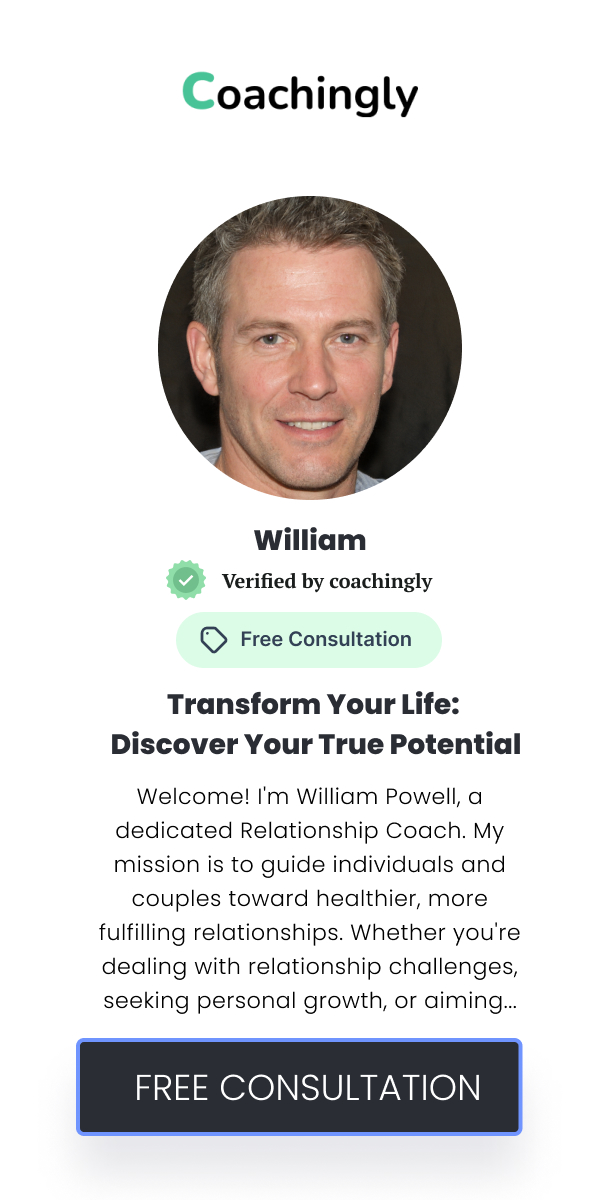
The Role of a Relationship Coach in Personal Development
![]() William Powell
William Powell
![]() July 18, 2024
July 18, 2024
Relationship coaching is a transformative practice focused on improving personal and relational aspects of life. Unlike traditional therapy, which often addresses deeper psychological issues and mental health concerns, relationship coaching centres on enhancing communication, resolving conflicts, and fostering personal growth. It aims to equip individuals and couples with practical tools and strategies for building stronger, more fulfilling relationships. By providing a supportive and empathetic environment, relationship coaches guide clients through a structured process designed to achieve specific personal and relational goals. The scope of relationship coaching includes improving interpersonal skills, managing emotions effectively, and developing a deeper understanding of oneself and others. This proactive approach empowers clients to address and overcome challenges, fostering a healthier relationship dynamic. Through targeted sessions, relationship coaching offers a path to enhanced personal development and enriched connections with others. Personal development plays a crucial role in shaping the dynamics of relationships. At its core, personal growth enhances self-awareness, which is vital for understanding one's own needs, desires, and behaviours. When individuals engage in personal development, they often experience an increase in emotional intelligence, enabling them to manage their emotions more effectively and respond to others with greater empathy. This heightened self-awareness and emotional regulation contribute significantly to more harmonious and balanced relationships. Additionally, personal development fosters a deeper understanding of personal values and goals, allowing individuals to align their actions and expectations within their relationships more effectively. By addressing personal barriers and cultivating positive habits, individuals can improve their interactions and build stronger, more supportive connections. Personal development ultimately creates a foundation for healthier relationships by promoting mutual respect, trust, and effective communication. A relationship coach performs several key functions that contribute to the improvement of personal and relational dynamics. One of the primary roles is enhancing communication skills, which involves teaching clients how to express themselves clearly and listen actively. Effective communication is essential for resolving misunderstandings and fostering mutual respect within relationships. Another critical function is conflict resolution, where coaches provide strategies for managing disagreements constructively. By addressing conflicts in a positive manner, individuals can maintain harmony and strengthen their bonds. Building trust and empathy is another fundamental aspect of a relationship coach's role, as these elements are crucial for developing and sustaining healthy relationships. Coaches help clients address past issues and cultivate a sense of security and reliability. Through these functions, relationship coaches support clients in creating lasting and meaningful connections. Their guidance enables individuals to navigate relational challenges with confidence and resilience. Personal development goals are integral to the relationship coaching process, focusing on achieving specific, meaningful outcomes. Setting and achieving goals involves identifying key areas of improvement and establishing clear objectives that align with personal values and relational aspirations. Relationship coaches assist clients in overcoming personal barriers, such as self-esteem issues or unresolved emotional conflicts, that may impact their relationships. By addressing these obstacles, individuals can create a more balanced and fulfilling approach to their interactions with others. Developing positive habits is another essential aspect of personal development in relationship coaching, as these habits support ongoing growth and stability. Coaches provide practical tools and techniques for cultivating habits that contribute to personal and relational success. Through goal setting and skill development, clients gain the insights and abilities needed to enhance their relationships and overall well-being. Personal development within relationship coaching promotes continuous improvement and a deeper connection with oneself and others. The coaching process involves several key steps designed to facilitate personal and relational growth. The initial assessment is a crucial stage where the relationship coach works to understand the client's unique situation and relationship dynamics. This involves exploring goals, challenges, and expectations to create a customised coaching plan tailored to individual needs. Once the plan is in place, clear, achievable goals are established to guide the coaching process. Setting these objectives ensures that clients have a concrete framework for measuring progress and success. Skill development is a central component of the coaching process, with coaches providing practical tools and techniques for enhancing communication, conflict resolution, and trust building. Ongoing support is essential for sustaining growth, as coaches offer regular guidance and adapt their approach based on the client's evolving needs. This continuous support helps clients navigate challenges and celebrate achievements along the way. The coaching process is designed to foster lasting change and improvement in both personal and relational aspects of life. Engaging with a relationship coach offers numerous benefits that contribute to personal and relational enhancement. One of the primary advantages is improved communication, where clients learn to express themselves more clearly and listen more attentively. This skill development leads to deeper connections and fewer misunderstandings within relationships. Another significant benefit is the strengthening of emotional connections, as relationship coaching fosters empathy and understanding between individuals. This increased emotional connection enhances the overall quality of relationships. Improved self-esteem and confidence are additional benefits, as personal growth achieved through coaching boosts an individual's self-worth and sense of self-efficacy. Better conflict management is another advantage, with clients developing strategies to handle disagreements constructively and maintain harmony. Overall, relationship coaching contributes to building stronger, more fulfilling relationships by promoting effective communication, trust, and personal growth. The benefits extend beyond the coaching sessions, positively impacting various aspects of clients' lives. Selecting the right relationship coach involves evaluating several key factors to ensure a good fit and effective coaching experience. Qualifications and experience are important considerations, as a well-qualified coach with relevant experience is better equipped to address clients' needs. Understanding the coach's approach and philosophy is also crucial, as different coaches may employ various methodologies and techniques. Clients should choose a coach whose style aligns with their personal preferences and goals. Compatibility between the client and coach is another essential factor, as a strong rapport and mutual understanding contribute to a successful coaching relationship. It is helpful to explore the coach's background, areas of expertise, and client feedback to make an informed decision. By considering these factors, individuals can find a relationship coach who is well-suited to support their personal and relational development. Choosing the right coach is a key step in achieving meaningful progress and improvement in one's relationships. Embarking on a journey with a relationship coach involves setting realistic expectations and committing to the process of growth. Clients should anticipate an initial phase of assessment and goal setting, followed by targeted skill development and ongoing support. Regular evaluation of progress helps track improvements and make necessary adjustments to the coaching plan. Commitment to the coaching process is essential for achieving desired outcomes and fostering lasting change. Clients should be prepared to actively engage in the coaching sessions and apply the strategies and tools provided. By maintaining a positive and proactive mindset, individuals can maximise the benefits of relationship coaching and achieve their personal and relational goals. The journey with a relationship coach offers valuable opportunities for growth, enhanced relationships, and a more fulfilling life.Understanding Relationship Coaching
The Impact of Personal Development on Relationships
Key Functions of a Relationship Coach
Personal Development Goals in Relationship Coaching
The Coaching Process
Benefits of Engaging with a Relationship Coach
How to Choose the Right Relationship Coach
Moving Forward with Relationship Coaching

Recent Articles
The Benefits of Relationship Coaching: How It Can Transform Your Life
Understanding Relationship Coa...
![]() Jul 31, 2024
Jul 31, 2024
Effective Communication: The Cornerstone of Healthy Relationships
Understanding Communication in...
![]() Jul 30, 2024
Jul 30, 2024
Conflict Resolution Strategies for a Stronger Relationship
Understanding Conflict in Rela...
![]() Jul 29, 2024
Jul 29, 2024
Personal Growth and Relationships: How Self-Awareness Can Improve Your Connections
Understanding the Link Between...
![]() Jul 28, 2024
Jul 28, 2024
Trust Building Techniques for Lasting Relationships
Understanding the Importance o...
![]() Jul 27, 2024
Jul 27, 2024
How to Rebuild a Relationship After a Major Conflict
Understanding the Impact of Ma...
![]() Jul 26, 2024
Jul 26, 2024
Boost Your Self-Esteem to Improve Your Relationship
The Connection Between Self-Es...
![]() Jul 25, 2024
Jul 25, 2024
Why Investing in Relationship Coaching is Worth Every Penny
Understanding Relationship Coa...
![]() Jul 23, 2024
Jul 23, 2024
Practical Tools for Enhancing Communication in Relationships
Understanding the Importance o...
![]() Jul 22, 2024
Jul 22, 2024
Setting Relationship Goals: The Key to Mutual Growth
Understanding Relationship Goa...
![]() Jul 21, 2024
Jul 21, 2024
How to Address Underlying Issues in Your Relationship
Maintaining a healthy relation...
![]() Jul 20, 2024
Jul 20, 2024
Building Empathy and Mutual Respect in Your Partnership
Understanding Empathy and Mutu...
![]() Jul 19, 2024
Jul 19, 2024
Managing Relationship Stress: Tips from a Professional Coach
Stress is an inevitable part o...
![]() Jul 17, 2024
Jul 17, 2024
The Importance of Active Listening in Building Strong Relationships
In today's fast-paced world, t...
![]() Jul 16, 2024
Jul 16, 2024
